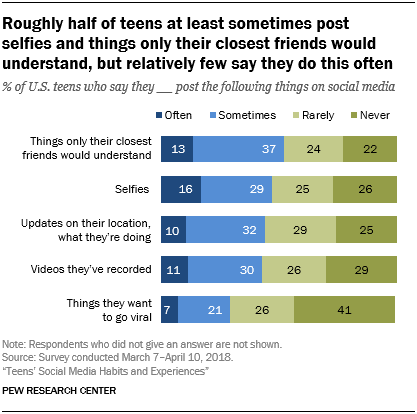Selfies can affect a teenager’s self-esteem and mental health, and cause a preoccupation with “likes.”Teenagers may take selfies as a form of entertainment, to document events in their lives, or to put on social media.
Parents and caregivers should be aware of the potential negative influences teens may face exposure to and help guide them on safely using selfies and social media for positive outcomes.
This article explores how taking selfies may affect teenager’s overall health and mental health. It also discusses healthy habits teens can form on social media with selfies and tips for talking about selfies with teens.
The impact of selfies and social media
Social media has given teens the ability to instantly connect with others and share their lives through photos, videos and status updates. Teens themselves describe these platforms as a key tool for connecting and maintaining relationships, being creative, and learning more about the world.
Filters and altering appearances
One potentially concerning aspect of selfies is filters that can dramatically change a person’s appearance. While some filters are entertaining and creative, others can distort reality and contribute to unrealistic beauty standards.
Viewing edited photos while scrolling on social media can cause teens to have negative feelings and insecurities about their own appearance.
According to a 2022 review, 28% of girls ages 8–18 admit to enhancing their photos to appear more attractive before posting them online.
Preoccupation with “likes” and validation
Research indicates that when teens post selfies and get “likes,” they feel social acceptance and higher levels of confidence. A lack of “likes” can lead to feelings of nonacceptance.
However, according to the same review, many teens are critical of people who post selfies solely to seek praise or validation from others.
This puts many adolescents in a tough spot, as they seek acceptance by their peers through “likes” but do not want to appear overly desperate for validation.
Dangerous trends and potentially harmful content
Adolescents ages 10–19 are in a critical stage of life when identities and self-worth are forming. During this time, a teen is more susceptible to peer pressure and opinions, which may push them into harmful situations they would otherwise avoid.
Trends and challenges on social media often revolve around taking selfies, some of which encourage dangerous behaviors.
Irreversible online content
Although the proliferation of smartphones has given teens the ability to constantly share different aspects of their lives, this survey finds that many teens regularly forego posting selfies, videos or other updates of their lives to social media.

Some 45% of teens say they often or sometimes post selfies on social media, with 16% saying they do this often. Similar shares of teens say they at least sometimes post things only their closest friends would understand (50%), updates on where they are or what they’re doing (42%) or videos they’ve recorded (41%).
Once an image is online, it is challenging to control who sees it, copies it, or shares it. This may expose teens to potential risks, such as cyberbullying or unwanted attention from strangers.
Healthy habits around selfies
Here are several ways teens can develop healthier habits around social media when taking and posting selfies:
- Limit screen time: Reducing time on social media — for instance, to 30 minutes per day — may help teens establish a healthy online and offline balance.
- Develop protective strategies: Learn how to block unwanted contact and keep personal information safe online.
- Share information cautiously: Be mindful about sharing personal information and appropriate images online.
- Promote authenticity: Teens can be themselves online and embrace their imperfections.
- Seek help: If social media is negatively affecting a teen, contacting a trusted adult is critical. People can also call 988 for immediate help from the Suicide and Crisis Lifeline.Listen actively: Let teens express their thoughts and feelings about selfies and social media. Listen without judgment and validate their feelings.
-
- Discuss the dangers of social media: Talk with teens about the potential risks around selfies and social media. Give them information on how to stay safe while online.
- Set online boundaries together: Discuss boundaries regarding screen time, privacy settings, and posting frequency.
- Lead by example: Demonstrate healthy social media and selfie behavior by modeling appropriate behaviors with social media, such as posting positive selfies and having a healthy online-offline balance.Protect from cyberbullying: Teens must not keep online harassment or bullying a secret but should contact a trusted adult for help.
Tips for speaking with a teenager about selfies
Parents and caregivers play an important role in helping teens stay safe while using social media and posting selfies. Here are some tips on how to talk with teens on this topic.
- Listen actively: Let teens express their thoughts and feelings about selfies and social media. Listen without judgment and validate their feelings.
- Discuss the dangers of social media: Talk with teens about the potential risks around selfies and social media. Give them information on how to stay safe while online.
- Set online boundaries together: Discuss boundaries regarding screen time, privacy settings, and posting frequency.
- Lead by example: Demonstrate healthy social media and selfie behavior by modeling appropriate behaviors with social media, such as posting positive selfies and having a healthy online-offline balance
Summary
While selfies may seem harmless enough, and many times they are, they can have negative consequences for teens in combination with social media. These can include diminished self-esteem, distorted body image, and behavior that may have harmful effects.
Parents and caregivers should understand these possible influences and guide teens toward using selfies and social media safely.
Reducing time on social media, promoting authenticity, and learning how to stay safe online can help reduce the risk of mental health consequences.





